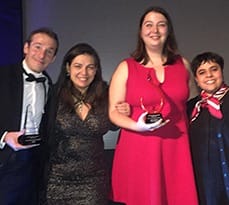Two ventures that are supported by the Accelerate Cambridge programme at Cambridge Judge were honoured with top prizes on 16 March at the annual Business Weekly Awards held at Queens’ College, Cambridge.
Jelena Aleksic of genetic testing company GeneAdviser was named winner of the inaugural Woman Entrepreneur of the Year Award, which was sponsored by Cambridge Judge, while rare-disease venture Healx was named Cambridge Graduate Business of the Year winner.
The awards ceremony attracted about 200 people, and prizes were presented by Warren East, Chief Executive of engineering company Rolls-Royce and former CEO at Cambridge-based computer chip designer ARM.

The first Woman Entrepreneur of the Year contest “was an extremely close-run affair but we decided on Jelena for a number of reasons, not least market validity and potential healthcare impact,” said Professor Sucheta Nadkarni of Cambridge Judge, who announced the new award that forms part of the Women’s Leadership Initiative launched last year at the School.
“Jelena founded and has grown GeneAdviser as an online marketplace for clinical genetic testing –making it easier for doctors to find and order lifesaving tests from accredited laboratories,” said Sucheta, Sinyi Professor of Chinese Management at Cambridge Judge. “In just one year, she has secured a flagship NHS lab as a customer, surveyed 1000+ clinicians and attracted interest from clinicians across Europe as well as leading life sciences investors. GeneAdviser addresses a great need for accessible genetic testing and will significantly impact the lives of potentially millions of patients globally with rare disease, cancer and neurological conditions.”
The award to Healx was announced by Hanadi Jabado, Director of the Entrepreneurship Centre at Cambridge Judge, which houses the Accelerate Cambridge programme.
“Healx, which was founded to match potential new cures to the world’s rarest diseases, has developed a novel treatment allocation method allowing prediction of drug response,” she said. “It is based on genomic signature matching between an individual patient and a drug and has the potential to revolutionise personalised medicine to improve patient outcomes and eliminate costly drug wastage in hospitals and throughout the NHS. It has the potential to help millions of people worldwide in an area of vast unmet need.”


